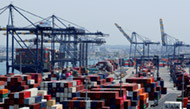
Along Route 3 in Laos and other areas where the roads pass, people are both fearful of China’s sway and hopeful about progress.
By THOMAS FULLERLUANG NAMTHA, Laos - The newly refurbished Route 3 that cuts through this remote town is an ordinary strip of pavement, the type of two-lane road you might find winding through the sunflower fields in the French provinces.
But On Leusa, 70, who lives near the road, calls it “deluxe.
As a young woman she traded opium and tiger bones along the road, then nothing more than a horse trail.
The prime ministers of Cambodia, China, Laos, Myanmar, Thailand and Vietnam officially inaugurated the former opium smuggling route as the final link of what they call the “north-south economic corridor, an 1,850-kilometer network of roads linking the southern Chinese city of Kunming to Bangkok.
The network, several sections of which were still unpaved as late as December, is a major milestone for China and its southern neighbors. The low-lying mountains here, the foothills of the Himalayas, served for centuries as a natural defensive boundary between Southeast Asian civilizations and the giant empire to the north. The road rarely follows a straight line as it meanders through terraced rice fields and tea plantations.
Today, those same Southeast Asian civilizations alternately crave closer integration with that empire and fear its sway as an emerging economic giant. China, in turn, covets the land, markets and natural resources of one of Asia’s least developed and most pristine regions.
With trade across these borders increasing by double digits every year, China has helped construct a series of roads inside the territory of its southern neighbors. The Chinese government is paying half the cost of a bridge over the Mekong River between Laos and Thailand, due for completion in 2011.
It financed parts of Route 3 in Laos and refurbished roads in northern Myanmar, including the storied Burma Road used by the Allies in World War II to supply troops fighting the Japanese. China is also building an oil and gas pipeline from the Bay of Bengal through Myanmar to Kunming.
Taken together, these roads are breaking the isolation of the thinly inhabited upper reaches of Laos, Myanmar and Vietnam, areas that in recent decades languished because of wars, ethnic rivalries and heroin trafficking. The roads run through the heart of the Golden Triangle, the region that once produced 70 percent of the world’s opium crop.
The new roads, as well as upgraded ports along the Mekong River, are changing the diets and spending habits of people on both sides of the border. China is selling fruit and green vegetables that favor temperate climates to its southern neighbors, and is buying tropical fruit, rubber, sugar cane, palm oil and seafood.
“You never used to see apples in the traditional markets, said Ruth Banomyong, an expert in logistics who teaches at Thammasat University in Bangkok.
China has blasted shallow sections of the Mekong to make it more easily navigable for cargo barges, allowing traders to ship apples, pears and lettuce downriver. The price of apples in Thailand has fallen to the equivalent of about 20 cents apiece from more than a dollar a decade ago. Roses and other cut flowers from China have displaced flowers flown in from the Netherlands, making Valentine’s Day cheaper for Thais. Traders now have the choice of shipping by barge, truck or both.
Overall, even before the completion of the road, trade between China and the upland Southeast Asian countries Cambodia, Laos, Myanmar, Thailand and Vietnam had risen impressively, to $53 billion in 2007 from just over $1 billion a decade ago.
People are on the move as well.
Wang Suqin, the director of express services at the Kunming bus terminal, says Chinese tourists are eager to travel overland to Thailand.
“Every day we receive calls about this, Ms. Wang said.
Chen Jinqiang, a Chinese government official from Xishuangbanna in Yunnan Province, said the road would help ensure that farmers get their vegetables and flowers to market, avoiding a problem he witnessed in the 1980s, when poor transportation left watermelons rotting in the fields. “Even the pigs refused to eat them, he said.
But the road also excites old fears of the monolith to the north.
Preecha Kamolbutr, the governor of Chiang Rai Province, in northern Thailand, said it might exacerbate what he calls a “Chinese invasion. He is particularly concerned for Laos, he said, an impoverished country the size of Britain but with a population of just 6.5 million.
“Chinese businessmen come in with their own capital, their own workers and their own construction materials, the governor said.
“I fear that in the future the Lao people might feel that they’ve been exploited. They will feel they’ve been invaded.
For now, those fears do not appear to be shared by many Laotians. Residents of the sparsely populated Luang Namtha Province said they welcomed visitors and were counting on an influx of Chinese, Thais and others to help raise their incomes.
Cash-strapped Laos is encouraging Chinese investment by handing out what it has plenty of: land. Deputy Prime Minister Somsavat Lengsavad has said the government will trade “land for capital.
Alinda Phengsawat, the head of tourism planning in the province, said the road would bring visitors to what has been a very remote part of the country. “Maybe they will stay overnight, she said.
Since paving was completed late last year, people who live deep in the jungle have come to the edge of Route 3 to sell vegetables and forest products, residents say.
“You have a huge hinterland that’s pretty badly served at the moment, from Kunming down through Laos and northern Thailand, said John Cooney, director of the Southeast Asia infrastructure division at the Asian Development Bank, which financed one section of the road in Laos. “That suddenly is becoming a market.
스마터리빙
more [ 건강]
[ 건강]이제 혈관 건강도 챙기자!
[현대해운]우리 눈에 보이지 않기 때문에 혈관 건강을 챙기는 것은 결코 쉽지 않은데요. 여러분은 혈관 건강을 유지하기 위해 어떤 노력을 하시나요?
 [ 건강]
[ 건강]내 몸이 건강해지는 과일궁합
 [ 라이프]
[ 라이프]벌레야 물럿거라! 천연 해충제 만들기
 [ 건강]
[ 건강]혈압 낮추는데 좋은 식품
[현대해운]혈관 건강은 주로 노화가 진행되면서 지켜야 할 문제라고 인식되어 왔습니다. 최근 생활 패턴과 식생활의 변화로 혈관의 노화 진행이 빨라지고
사람·사람들
more많이 본 기사
- 美, 카리브해로 특수부대 전개…베네수 작전 개시 임박했나
- 대법원 “최종심 나올 때까지 시카고에 주방위군 투입 안돼”
- 델라웨어 차량등록국서 총격…州경찰관 1명 사망
- 법무부, ‘반자동 소총 금지’ 워싱턴DC 상대 소송… “위헌”
- “트럼프 행정부, 스페이스X에 동물보호구역 토지 양도 검토”
- ‘헉’ 오바마케어 보험료가 연 4만불… 1
- 경찰, ‘통일교 로비 의혹’ 한학자·윤영호 오늘 2차 접견조사
- 트럼프, GDP 호조에도 “금리 내려야…동의못하면 연준의장 안돼”
- 박나래, 논란 또 추가..이번엔 ‘나혼산’ 조작 방송 의혹
- 조지아서 역주행 승용차 덮쳐 한인 등 2명 사망
- 법무부, 엡스타인 자료 추가 공개… “전용기에 트럼프 8번 타”
- 46회째 1등 안나온 파워볼 복권…당첨금 약 16억 달러로 껑충
- 2명에 모두 7,500달러 장학금
- [새해 강화되는 노동법] 가주서 노동… 1
- 임윤아, 여우 주연상 쾌거.. “멋진 상 감사합니다”
- “ATM기 사용하기 겁나네”
- ‘트롯돌’ 손태진, 오디션 우승상금 7~8억?.. “무서워서 1년 넘게 안 썼다”
- ‘차량 링거’ 전현무 의료법 위반 고발당해… “적법한 진료” 해명
- 워너브러더스 주주 “파라마운트 인수안 여전히 불충분”
- 이영지 맞아? 러블리 분위기 물씬..180도 달라진 ‘뼈말라’ 몸매
- 中과 무역갈등 휴전한 美 “中반도체 추가관세 18개월간 보류”
- 연말 여행객 최다… LAX 공항 ‘대혼잡’
- 트럼프 “국가안보 위해 그린란드 필요…우리가 가져야”
- 21년간 장학금 총 60만 달러 지급
- 송성문, 메디컬테스트에 초긴장 “혹시 뭐 나올까 걱정했다→미국 열심히 갔는데 맨손으로 돌아올까봐”
- 올해 워싱턴DC 식당 92곳 폐업…‘역대 최다’
- ‘K-도넛’, 남가주 진출·본격 확장
- 1,480원까지 돌파한 환율… “내년에도 고공 행진”
- 20%만 “트럼프 덕에 살림살이 나아졌다”
- 美 경제 3분기 4.3% ‘깜짝 성장’…강한 소비가 성장견인
- ‘연방하원 도전장’ 척 박 예비후보 후원모임
- 이번엔 ‘먹는 비만약’ 경쟁…알약 위고비, 미국서 판매 승인
- 에어프랑스 엔진 화재 5천피트 급강하 ‘아찔’
- 공정위, 대한항공 마일리지 통합안 보완명령
- “美국방부, 中격납고에 ICBM 100기이상 장전돼 있을것으로 판단”
- ICE 홈디포 급습 한인 체포
- ‘거액 탈세·통관 사기’ 한인 통관브로커 중형
- 4인 가족 보험료가 4만불까지… 중산층‘불안’
- 악명 높은 갱단 연루 한인 기소
- ‘올해는 ICE 이민자 체포 광풍의 해’
- ‘크리스마스 캐롤’과 산타 클로스 1
- 아마존, AI에이전트 출시 수요예측·재고관리 기능
- 양민혁·배준호 등 병역특례 기대감 커졌다, 日 자국 아시안게임도 ‘U-21’ 참가
- 한인 박찬영씨 교통시비 총격 사망...타코마중앙장로교회 40대 장로, 19일 레이시 도로서 참변
- 美서 돌아온 푸틴 특사…러, 우크라 평화안 대응 촉각
- [정재민의 미디어풍경] 적과의 동침, 협력하며 경쟁하기
- 엡스타인 파일서 지웠던 트럼프 사진 복원
- “불모지에 뿌린 한국어 씨앗”
- 베네수엘라 봉쇄에 금·은 값 또 최고
- “기부잔여신탁(CRT)의 놀라운 힘”
1/5지식톡

-
 미 육군 사관학교 West Poin…
0
미 육군 사관학교 West Poin…
0https://youtu.be/SxD8cEhNV6Q연락처:wpkapca@gmail.comJohn Choi: 714-716-6414West Point 합격증을 받으셨나요?미 육군사관학교 West Point 학부모 모…
-
 ☝️해외에서도 가능한 한국어 선생님…
0
☝️해외에서도 가능한 한국어 선생님…
0이 영상 하나면 충분합니다!♥️상담신청문의♥️☝️ 문의 폭주로 '선착순 상담'만 진행합니다.☎️ : 02-6213-9094✨카카오톡ID : @GOODEDU77 (@골뱅이 꼭 붙여주셔야합니다…
-
 테슬라 자동차 시트커버 장착
0
테슬라 자동차 시트커버 장착
0테슬라 시트커버, 사놓고 아직 못 씌우셨죠?장착이 생각보다 쉽지 않습니다.20년 경력 전문가에게 맡기세요 — 깔끔하고 딱 맞게 장착해드립니다!장착비용:앞좌석: $40뒷좌석: $60앞·뒷좌석 …
-
 식당용 부탄가스
0
식당용 부탄가스
0식당용 부탄가스 홀세일 합니다 로스앤젤레스 다운타운 픽업 가능 안녕 하세요?강아지 & 고양이 모든 애완동물 / 반려동물 식품 & 모든 애완동물/반려동물 관련 제품들 전문적으로 홀세일/취급하는 회사 입니다 100% …
-
 ACSL 국제 컴퓨터 과학 대회, …
0
ACSL 국제 컴퓨터 과학 대회, …
0웹사이트 : www.eduspot.co.kr 카카오톡 상담하기 : https://pf.kakao.com/_BEQWxb블로그 : https://blog.naver.com/eduspotmain안녕하세요, 에듀스팟입니다…
케이타운 1번가
오피니언
 조환동 / 편집기획국장·경제부장
조환동 / 편집기획국장·경제부장 AI로 가속화되는 노동시장 개편
 민경훈 논설위원
민경훈 논설위원‘크리스마스 캐롤’과 산타 클로스
 정재민 KAIST 문술미래전략 대학원 교수
정재민 KAIST 문술미래전략 대학원 교수 [정재민의 미디어풍경] 적과의 동침, 협력하며 경쟁하기
 김영화 수필가
김영화 수필가 [화요칼럼] 단호박의 온기
 김정곤 / 서울경제 논설위원
김정곤 / 서울경제 논설위원[만화경] 안중근의사 유해봉환 사업
 권지숙
권지숙 오후에 피다
 옥세철 논설위원
옥세철 논설위원말살되고 있는 유럽의 성탄절 전통, 그 원인은…

외로운 이웃들
 조지 F·윌 워싱턴포스트 칼럼니스트
조지 F·윌 워싱턴포스트 칼럼니스트 [조지 F. 윌 칼럼] MIT에 대한 트럼프의 무분별한 공격
1/3지사별 뉴스

‘연방하원 도전장’ 척 박 예비후보 후원모임
연방하원에 도전장을 낸 척 박(한국명 박영철) 예비후보 후원 모임이 지난 18일 열렸다. 척 박의 부친인 박윤용 뉴욕주하원 25선거구 (민주)…
‘경찰 무력사용지침 갱신 의무화’ 입법 초읽기

‘올해는 ICE 이민자 체포 광풍의 해’
올 한해동안 버지니아와 메릴랜드, DC 등에서 연방 이민당국에 체포된 사람이 1만명이 훌쩍 넘는 것으로 조사됐다. 또 미 전국적으로는 22만명…
“ATM기 사용하기 겁나네”

연말 ‘로드레이지’ 비극… 한인 총격 피살
연말을 맞아 도로 위에서 순간적으로 벌어진 운전 중 시비가 40대 한인 가장의 총격 피살 비극으로 이어졌다. 워싱턴주 레이시 경찰국과 서스턴 …
엡스타인 파일 공개 다음날 트럼프 사진 삭제…야당서 탄핵 경고

오늘 하루 이 창 열지 않음 닫기 





















































.png)


댓글 안에 당신의 성숙함도 담아 주세요.
'오늘의 한마디'는 기사에 대하여 자신의 생각을 말하고 남의 생각을 들으며 서로 다양한 의견을 나누는 공간입니다. 그러나 간혹 불건전한 내용을 올리시는 분들이 계셔서 건전한 인터넷문화 정착을 위해 아래와 같은 운영원칙을 적용합니다.
자체 모니터링을 통해 아래에 해당하는 내용이 포함된 댓글이 발견되면 예고없이 삭제 조치를 하겠습니다.
불건전한 댓글을 올리거나, 이름에 비속어 및 상대방의 불쾌감을 주는 단어를 사용, 유명인 또는 특정 일반인을 사칭하는 경우 이용에 대한 차단 제재를 받을 수 있습니다. 차단될 경우, 일주일간 댓글을 달수 없게 됩니다.
명예훼손, 개인정보 유출, 욕설 등 법률에 위반되는 댓글은 관계 법령에 의거 민형사상 처벌을 받을 수 있으니 이용에 주의를 부탁드립니다.
Close
x